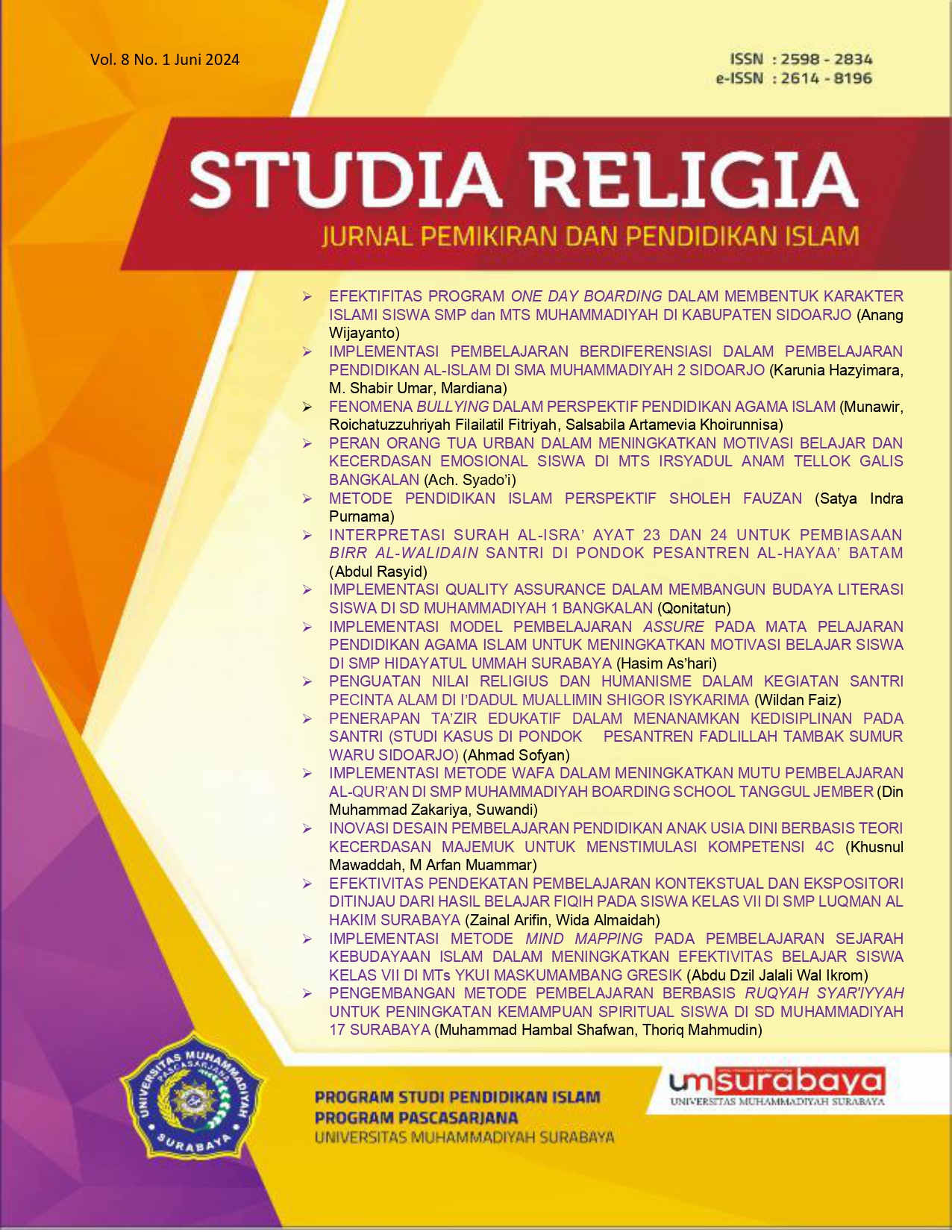INTERPRETASI SURAH AL-ISRA’ AYAT 23 DAN 24 UNTUK PEMBIASAAN BIRR AL-WALIDAIN SANTRI DI PONDOK PESANTREN AL-HAYAA’ BATAM
DOI:
https://doi.org/10.30651/sr.v8i1.22481Keywords:
Interpretasi, Untuk, Penbiasaan, Birr Al-Walidain, SantriAbstract
This research aims to discuss the interpretation of Surah Al-Isra' Verses 23 and 24 for the Birr Al-Walidain Habituation of Santri at the Al-Hayaa' Islamic Boarding School in Batam. This research uses a descriptive qualitative approach. Data collection techniques use interviews, participant observation and documentation. Data analysis consists of data reduction, data presentation and drawing conclusions. Checking the validity of the data was carried out through extended participation, diligent observation and triangulation. The results of this research explain that (1) Interpretation of Surah Al-Isra' Verses 23 and 24, consisting of three chapters: a) the priority of doing good to parents, b) the rights of parents while they are still alive, and c) the rights of parents after die. And the source of teaching materials is the Al-Qur'an and Al-Sunnah; (2) Steps in interpreting it: a) Every hour at the end of the teaching and learning process (PBM) before going home, the students in their respective classes receive direction from the teaching staff to implement the values of birrul waalidaiin. This is intended so that every instruction from the teaching staff to the students is still fresh in their minds when they get home. b) At the beginning of learning outside the classroom (in the mushalla-halaqah) during the classical period after morning dhikr before entering class, the students receive questions from the teaching staff on duty, who and what birrul waalidaain deeds they have done after coming home from school; (3) The impact of the interpretation of Surah Al-Isra' Verses 23 and 24 for the habituation of Birr Al-Walidain Santri at the Al-Hayaa' Batam Islamic Boarding School has been able to change the students (santri) to a better attitude. This is in accordance with the goal to be achieved, namely the formation of a scientific discipline as a good character for individual students.
References
Al-Asyqar, Muhammad Sulaiman. Zubdatut Tafsir Min Fathil Qadir. Mekah: Darussalam, 2020.
Al-Sa’di, Abdurramȃn bin Nȃsir. Taisȋru Al- Karȋm Al-Rahmȃn Fi Tafsȋr Kalȃm Al-Mannȃn. Beirut: Muassasah al-Risȃlah, 2002.
Ardiansyah, Muhammad. Konsep Adab Syed Muhammad Naquib Al-Attas. Depok: Yayasan Pendidikan Islam At-Taqwa, 2020.
Ginanjar, M. Hidayat. “Urgensi Lingkungan Pendidikan Sebagai Mediasi Pembentukan Karakter Peserta Didik.” Edukasi Islami Jurnal Pendidikan Islam 02 (2013): 376–396. https://jurnal.staialhidayahbogor.ac.id/index.php/ei/article/view/37.
Hanso, Blum. “Peran Pendidikan Dalam Memembentuk Karakter Bangsa Menghadapi Era Masyarakat Ekonomi ASEAN (MEA).” jurnal rontal keilmuan PPKn 2 (2016): 1–7.
Maunah, Binti. “Implementasi Pendidikan Karakter Dalam Pembentukan Kepribadian Holistik Siswa.” Jurnal Pendidikan Karakter, no. 1 (2016): 90–101.
Moeleong, Lexy. Metodologi Penelitian Kualitatif. Bandung: Remaja Rosdakarya, 2002.
Shafwan, Muhammad Hambal. “Analisis Model Pendidikan Tauhid Di Pesantren Al-Ikhlash Lamongan, Indonesia.” Tsaqafah 17, no. 1 (2021): 141–160. https://ejournal.unida.gontor.ac.id/index.php/tsaqafah/article/view/6662.
———. “HADITH EDUCATION IN FORMING CHARACTER OF EARLY CHILDHOOD.” Studia religia 4, no. 1 (n.d.): 01–11. https://core.ac.uk/download/pdf/327263797.pdf.
Sumara, D; Humaedi, S; Santoso, M. D. “Kenalakan Remaja Dan Penanganannya.” penelitian & PPM 4, no. kenkalan remaja (2017): 129–389.
Tolchah, Moch, and Muhammad Arfan Mu’ammar. “Islamic Education in the Globalization Era; Challenges, Opportunities, and Contribution of Islamic Education in Indonesia.” Humanities and Social Sciences Reviews 7, no. 4 (2019): 1031–1037.
Downloads
Published
Issue
Section
License
Copyright (c) 2024 Abdul Rasyid

This work is licensed under a Creative Commons Attribution-NonCommercial 4.0 International License.
Penulis tetap memegang hak atas karyanya dan memberikan hak publikasi pertama kepada jurnal ini yang secara simultan karya tersebut dilisensikan di bawah:
Creative Commons Attribution-NonCommercial 4.0 International License









